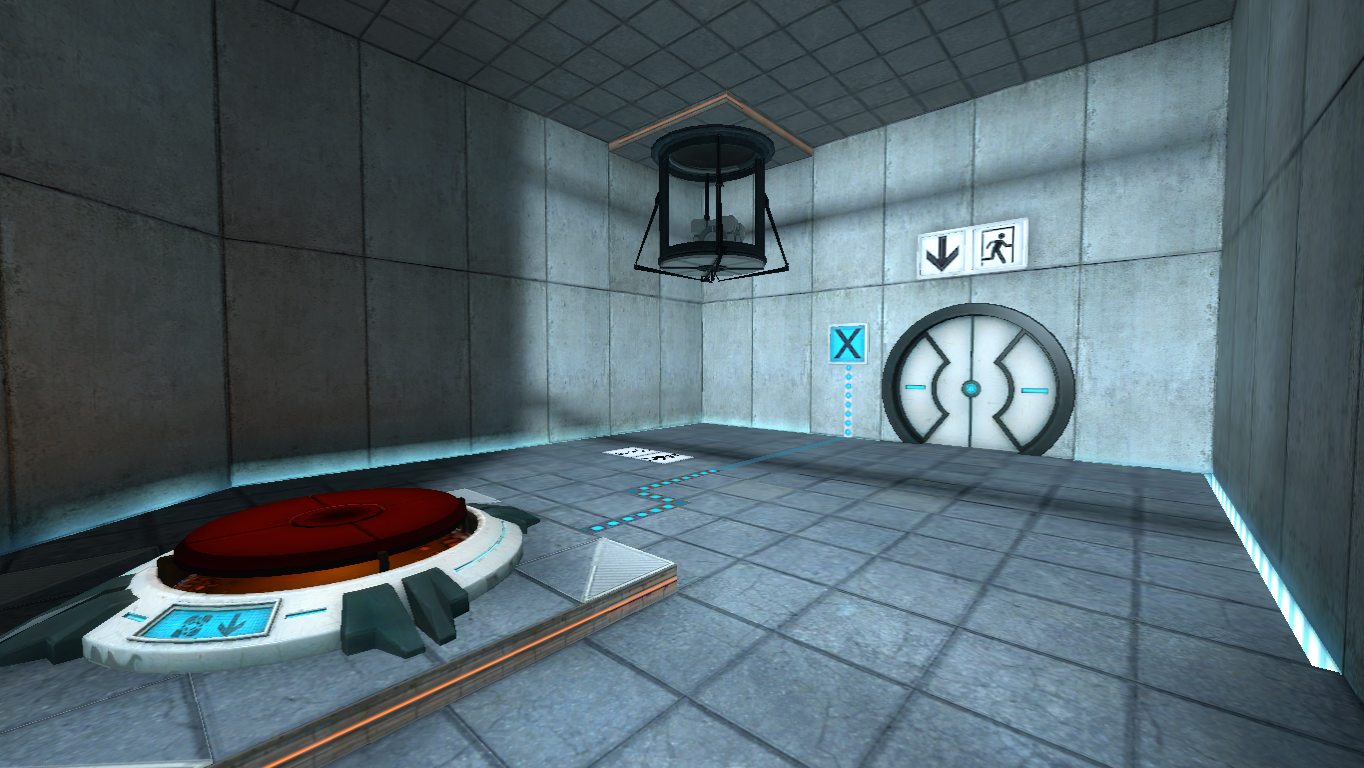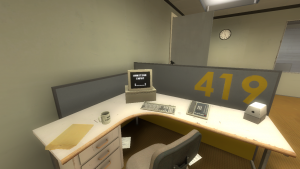Back in 2011, when the Source engine was still making waves as a modder’s video game development playground before the domination of Unity, a bizarre little mod was released called The Stanley Parable. It was about an office drone named Stanley who found all of his coworkers mysteriously missing one day, and decided to find out the reason why. Or rather, the player of the game was instructed to and informed by a narrator, and you could disobey those instructions, creating radical new outcomes. In 2013, the entire game was remade from the ground up and got a commercial release, upping the ending count from six to over a dozen. It received all sorts of accolades from all sorts of press, and became one of those games people had trouble describing because doing so would give away its entire trick.
But what makes the game so odd is that it became popular in the first place. Most fluke indie hits, like Super Meat Boy or Undertale, are steeped heavily in gaming tradition and even inform themselves with darling classics as their foundation. Despite being created with a Half-Life 2 mod program, The Stanley Parable only has the most basic mechanics of movement from Valve’s engine. It’s not a game where you shoot aliens in the face or solve complicated puzzles. Really, it has more in common with the games of The Chinese Room (Everybody’s Gone to the Rapture, Dear Esther) or Tale of Tales (The Path, Sunset), the whipping boys of the mainstream gaming press. These studios all focus on narrative heavy games where mechanics are limited to moving in a 3D field and occasionally making choices that affect the outcome of the narrative (though Chinese Room has a habit of forgetting to actually include any sort of choice).
What sets Galactic Cafe apart here is that The Stanley Parable is actually a bit of a criticism of these sorts of games. But more importantly, it’s a giant, cynical satire exploring player importance, developer vision, the nature of choice in structured systems, the desire for escapism, and what it means to “beat” a game.
Or, in layman’s terms, it’s a game about games that has a British man with a lovely voice saying wacky things and has an ending where you follow a yellow line as the most repetitive adventure music plays pointlessly as you and the narrator try desperately to find the story you both lost track of about five minutes ago because you just had to use that elevator on the side and have the big reveal spoiled for you. It’s a pretty good game.
Light spoilers ahead: This game is best played with as little knowledge of it as possible, if you have any interest in trying it, read everything after this point only after you played it. Keeping hard information from endings besides the “good” one and such out of this, but lots of info will be spilled.
The game starts out very simply, with the narrator telling you that all of Stanley’s fellow office drones have disappeared, then guides you from there. Listening to all his instructions plays out a simplistic and drab story where Stanley, an office drone, discovers he was under the influence of his evil boss’ mind control machine and destroys it, then gets freedom from the office, showing his desire to choose for himself – with the obvious irony being that this ending only occurs if you do everything the mysterious voice tells you to do. Where the real interesting stuff happens is when you choose to do things a little differently.
The first (easily apparent) choice you have is going through a left door or right door. The left door is where the narrator wants you to go, but going the other way has him trying to come up with a reason for the strange behavior to get his story back on track. Even if you pick the left door, there are still points where you can deviate from the story presented. Some of these choices reveal new endings with much darker revelations, like Stanley having had gone mad and running around wildly on the streets before dropping dead, or they outright tear down the forth wall and leave it as ruble under its feet – in one case literally.
This is where the game starts showing its hand. The joke in the “good” ending is that the entire point of the story, choice being an absolute good, is rendered moot because you didn’t actually make decisions to reach that ending. The game is giving you a hint that the narrator, ultimately a designer for the game and a sort of god of this world, has a distinct vision, and the player making choices he does not guide them to do leads to that vision being shattered. There is no ending that has a happy agreement between the narrator or Stanley. The narrator puts control on Stanley, even in the “good” ending, while Stanley or the player’s attempts at rebellion are ultimately just planned possibilities in a player space made by the developers of the game proper and can have no true satisfying freedom beyond spiting the narrator through self-destructive acts, or acts that destroy the world around you by inviting new logic it can’t understand or handle. Stanley himself will also continue being a construct in this fake world, just an avatar for the player, and can never truly be free.
Both the game developer and the game player are mocked viciously. The narrator’s desire for a perfect narrative scenario makes him an antagonist, even punishing Stanley for wanting power in one ending with an unsolvable series of puzzles. He’s treated as a fool, but also with a bit of the people who made it mixed in, with some rants of his feeling like their personal frustrations with making games for players who may have no respect for your vision. Even the game achievements are like this, with one said to be outright impossible (and getting it requires an obnoxious amount of effort) and another that mocks the player for even attempting it. Those achievements distract from the main purpose of the game, so the achievements made are just a mean spirited joke at the expense of the player. It’s something you’d see the narrator doing, no question.
The commentary on the player, on the other hand, is very venomous at points, but also sobering. The office setting isn’t just flavoring, it’s thematic. The office nobody Stanley ultimately wants a sense of meaning more than anything, which is dead end soul crushing job can’t offer. One ending casts him as a broken man who day dreams that he leaves an impact on the world in some way to give himself a sense of importance he lacks. While there’s a lot of jokes at the expense of really obsessive players (like the leader-board bit in the games ending), the game also explores why many of us play games and why it’s important in so many titles that the player be the most importance person in the narrative, and it’s not just about feeling powerful. Even with all the choices games offer today, we’re still playing in carefully designed constructs based entirely around limitations, so we can never have true freedom within them. Still, we desire freedom to express or influence within those constructs.
The game also tackles the idea of a “canon” story with the narrator, arguing that all choices and outcomes in a game’s design can have equal meaning and value. That’s really pushed here through a lot of story divergences in every ending that don’t really add up to a proper mythology. To really appreciate The Stanley Parable, you can’t just look at one ending and decide that’s the entire point, every little shift in the tale results in something radically different that adds to the whole. Think of it like a visual novel game with multiple endings, like Fate/Stay Night. They ultimately have more impact when you explore all those endings, because in many cases, those different stories intertwine in plot or thematic ways that have more meaning with different context from another story.
But it’s this choice motif where the game’s most interesting commentary and humor come from. Everything comes back to the concept of choice, something the game has a lot to say on, like how meaningless real life choices are in the grand scheme of things, and how the illusion of choice in a game can be both flaccid and powerful. There are a lot of pointless or minor choices in the game, like locking yourself in a broom closet to annoy the narrator or exploring the boss’ bathroom, but the major ones cause things to branch off in wild, insane directions. However, because every choice you can make in the game has equal meaning in some fashion because of the way the creators wanted the game to be played (exploring those choices), they have far less meaning to the player because those choices are not meant to inflate the ego. There’s even one ending where the narrator mocks you for committing suicide via fall to exert your own power on the scenario, which only leads to a reset. The game wants to highlight just how limiting but enjoyable these sort of fictional decisions are, that they affect how we think and feel, but not really anything in our immediate lives besides distract from the world around us.
But if that’s too heavy for you don’t worry. The developers also have the comedic sensibilities of spiteful teenagers, so these profound moments are also met with uncontrolled absurdity (the confusion ending is magical) and mean-spirited parody and self-deprecation (such as a four hour game where you have to press a button to stop a baby from walking into a fire). It’s hard not to laugh at and with the game, even when the joke is on you, which makes the dramatic moments all the more surprising. The ending in the parking garage really caught me off guard, even with prior knowledge of the game’s tricks, and had me moving along to the narrator’s game exactly as he wanted.
The execution is fantastic across every major moment and sequence, and while you can see the majority of everything in under three hours (the art ending needs at least four hours alone to see without hacking), it’s absolutely worth the price. The Stanley Parable is a much more approachable title of its ilk because of that streak of humor and the simplicity of its world. It also has a lot to discover and doesn’t ignore the importance of the player in the story being told, even if the paradox is that the player can’t really assert their will within the game and only explore it.
There’s a reason this game got so many gushing reviews and even worked its way into popular culture. When House of Cards uses something as a thematic metaphor, you’ve got something interesting there. But there’s also an overlooked reason the game got as big as it did; let’s players. When releasing the game, Galactic Cafe got creative and sent out demo versions that were a completely new scenario to let’s players popular in the public eye. Many first learned of the game watching a Game Grumps play-through, only to be as confused as the two playing it (Dan and Ross) when the narrator of the game exclaimed “GODDAMN IT, ROSS.” Even in marketing, the team played with the expectations of those playing and watching, and that really paid off. If any other game tried pulling off a stunt like that, most would probably despise it, but The Stanley Parable is pretty much the perfect title for that sort of trick.
There is really nothing quite like The Stanley Parable, even among other games that are also about being games and what that means to all those involved. Albeit mostly through provoking, it’s one of the grimmest games that don’t become an outright horror story. Also, the team made a perfect choice by letting Kevan Brighting do the narration. If you’re going to be called an idiot, it’s probably best to hear it from a charming British man. He even writes a song about how stupid you are at one point, and that is pretty great. More games narrated by charming British men, please.




























